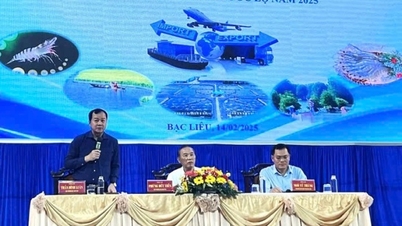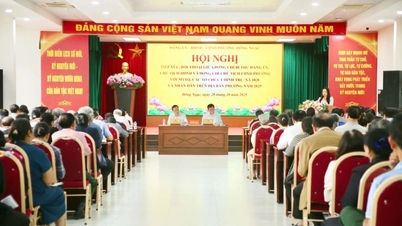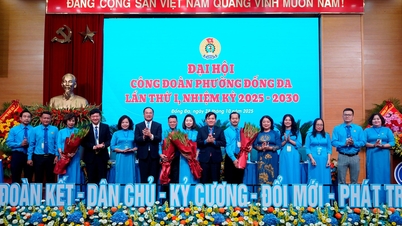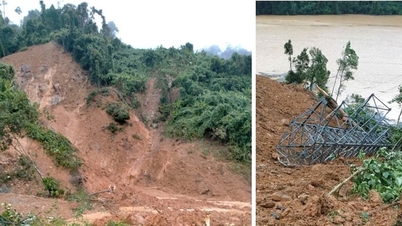Over the past century, increased use of nitrogen fertilizers has contributed significantly to boosting agricultural production and improving food security, ensuring nutrition for a growing global population. However, improper use of nitrogen can seriously damage air, water and soil quality, lead to biodiversity loss and exacerbate climate change.
A report released on January 21 by the Food and Agriculture Organization of the United Nations (FAO) provides a comprehensive overview of nitrogen use and the challenges arising in agricultural systems, highlighting the importance of sustainable use and making recommendations to achieve this goal.
Nitrogen is an essential component of food ingredients, especially amino acids and proteins, which are essential for the growth of plants, animals, and humans. Thanks to the invention of the Haber–Bosch process in the early 20th century, humans were able to convert unreactive nitrogen, abundant in the atmosphere (the same nitrogen that makes the sky blue) into useful substances such as ammonia, which is now widely used as a fertilizer.
Humans are currently adding about 150 teragrams (Tg) of reactive nitrogen to Earth's land surface each year through agriculture and industry, which is twice the pre-industrial rate. Some experts believe that climate change could contribute to this increase to about 600 Tg per year by 2100, which could increase the amount of nitrogen lost to the environment.
Livestock is a major contributor to nitrogen emissions and is responsible for approximately one-third of all nitrogen emissions from human activities. Synthetic fertilizers, land-use change, and manure emissions are the main causes of nitrogen pollution in this region.
Judicious use of nitrogen in agriculture helps prevent soil degradation and nutrient depletion while increasing crop yields. Conversely, excessive use exacerbates global warming, reduces air and water quality, and depletes stratospheric ozone. Nitrogen pollution poses risks to human health by increasing the incidence of respiratory and heart diseases. Therefore, sustainable nitrogen management that focuses on minimizing inputs and external losses and maximizing recycling is more urgent than ever.
Through several case studies illustrating ongoing efforts to improve nitrogen use worldwide , FAO has made recommendations, including:
- The fertilizer industry needs to take urgent action to reduce greenhouse gas emissions from the production of mineral nitrogen fertilizers and encourage the minimization of waste losses during storage, transportation and application to land;
- Promote the widespread use of biological nitrogen fixation in locally appropriate crop rotations using legumes;
- Guidance to support producers in adopting best practices for manure management, focusing on minimizing nitrogen loss to the environment and increasing its efficient use in agricultural production;
- Agri-food system policies should encourage the use of organic nitrogen fertilizers to enhance sustainability;
- Promote the integration of sustainable nitrogen management into nationally appropriate mitigation actions and nationally determined contributions, including targets for reducing nitrous oxide from agri-food systems to maintain the 1.5°C target of the Paris Agreement;
- Propose national commitments to reduce nitrogen pollution, including ammonia and nitrate, to meet global biodiversity goals;
- Strengthen efforts to reduce food waste and loss at all stages of the agri-food system and promote recycling and treatment of food waste for animal feed;
- Integrate sustainable nitrogen management into development projects and programs in agri-food systems.
Source: https://www.mard.gov.vn/Pages/cai-thien-su-dung-nito-de-giam-thieu-tac-hai-doi-voi-suc-khoe-con-nguoi-va-moi-truong.aspx


![[Photo] Draft documents of the 14th Party Congress reach people at the Commune Cultural Post Offices](https://vphoto.vietnam.vn/thumb/1200x675/vietnam/resource/IMAGE/2025/10/28/1761642182616_du-thao-tai-tinh-hung-yen-4070-5235-jpg.webp)



![[Photo] Flooding on the right side of the gate, entrance to Hue Citadel](https://vphoto.vietnam.vn/thumb/1200x675/vietnam/resource/IMAGE/2025/10/28/1761660788143_ndo_br_gen-h-z7165069467254-74c71c36d0cb396744b678cec80552f0-2-jpg.webp)
![[Photo] National Assembly Chairman Tran Thanh Man received a delegation of the Social Democratic Party of Germany](https://vphoto.vietnam.vn/thumb/1200x675/vietnam/resource/IMAGE/2025/10/28/1761652150406_ndo_br_cover-3345-jpg.webp)


















![[Photo] President Luong Cuong attends the 80th Anniversary of the Traditional Day of the Armed Forces of Military Region 3](https://vphoto.vietnam.vn/thumb/1200x675/vietnam/resource/IMAGE/2025/10/28/1761635584312_ndo_br_1-jpg.webp)









































































Comment (0)